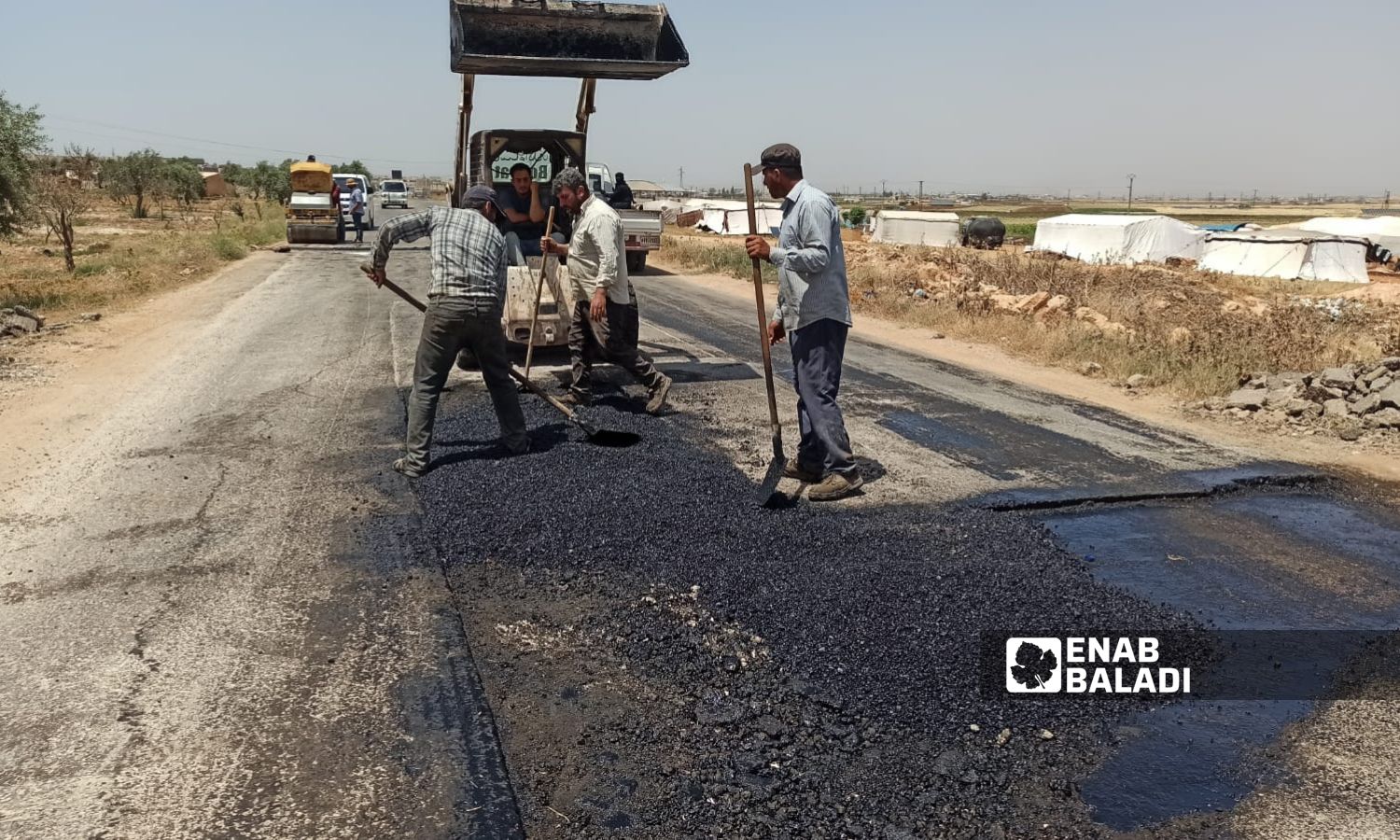



Idlib – Anas al-Khouli
Malik al-Musallam (39 years old) suffers from numerous breakdowns to the taxi he works with due to the poor roads and many potholes both within the town of al-Foua in northern Idlib, where he resides, as well as on the roads connecting with its neighboring town Kafriya or with the city of Idlib.
Al-Musallam, who is displaced from Homs and resides in al-Foua, transports passengers several times a day to Idlib on roads that have caused him significant losses due to the frequent repairs he has to carry out, he told Enab Baladi.
He said that he tries to drive slowly to avoid major damage to his car, but he has to respond to some requests at night, particularly during childbirth cases, which forces him to speed up a bit, exposing his car to damages due to the many potholes.
The towns of Kafriya and al-Foua suffer from damaged infrastructure, including roads, as a result of extensive damage from shelling and clashes over the past years, before the area settled with displaced people from various regions in Syria.
Since 2018, displaced people from Damascus and its countryside, Hama, Daraa, southern Idlib countryside, and Homs have been living in al-Foua and Kafriya. The military factions operating in the region share control over these adjacent towns, based on sectors under each faction’s control.
According to Enab Baladi‘s correspondent, the poor condition of roads is not limited to the main roads but also includes the secondary ones, causing damage to cars and motorcycles, and they are even bad for walking. They become worse during the winter.
Talal al-Mohammad (35 years old), displaced from the countryside of Hama in the town of Kafriya, considers that potholes disrupt the movement of residents, and it is hard to find an intact street free of potholes.
Jamila al-Sayyed (28 years old), residing in al-Foua, complained about the numerous potholes filled with water and her children returning dirty in the summer and winter with dust and mud.
Salih al-Abdullah (41 years old), also residing in al-Foua, owns a tricycle as he is disabled, and he frequently has to repair it due to the damage caused by the potholes.
Al-Abdullah told Enab Baladi that the breakdown of his tricycle and waiting for its repair keep him at home without movement or mobility outside.
The Central Region Administration of the Syrian Salvation Government in Idlib has carried out some repairs following repeated complaints from residents, but they have not been sufficient to fill all the potholes and did not meet the demand.
The Head of the Central Region municipality, Safwan Badle, told Enab Baladi that the municipality conducted necessary studies following repeated complaints about the poor infrastructure in al-Foua and Kafriya.
Badle mentioned that the long years of war caused significant damage to the infrastructure in the region, especially the roads and sewage networks, making it difficult to rehabilitate all the roads and sewage networks throughout northern Syria due to the high costs involved.
He added that the Central Region municipality has laid out plans to maintain the roads according to available capabilities, patching some of the main roads and the roads leading to schools, mosques, and the main road connecting Kafriya and al-Foua.
The repair process began in early June last year, and the Salvation Government provided 70 cubic meters of mixed asphalt, a very small quantity. Therefore, the work started according to priorities, said Badle.
The municipality head pointed out that securing asphalt material is extremely costly due to its unavailability in the northern region, noting that the municipality is working on improving the infrastructure in the area by implementing several projects, including road lighting, sewage line maintenance, and road repairs, promising to fully repair them in later stages.
Badle considered that placing interlocking stones proved ineffective because these materials cannot withstand the passage of heavy-loaded trucks; thus, work is ongoing to use them between neighborhoods and secondary roads in the future.
The partial repair process carried out by the Central Region municipality did not gain the approval of the residents in the area, who saw the patchwork as a superficial response to their demands and did not solve their problems. The presence of potholes in the secondary roads causes the same damage.
if you think the article contain wrong information or you have additional details Send Correction